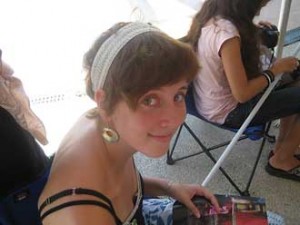
By Sibeal McCourt
The very first thing you notice about Barbados is the heat. That Caribbean sun is hot. Really, swelteringly, hot. Every-piece-of-clothing-is-sticking-to-you hot!
The next thing you notice is the riot of colours. Sapphire skies, emerald trees, gold sand. All I could think of during the taxi ride in from the airport was, how on earth am I going to concentrate on my Barbados Field Study Semester (from Aug. 31-Dec. 10) when all I want to do is lie on the beach and go swimming in that lovely cerulean sea?
As it turns out, I did get to do lots of swimming (and snorkeling and surfing) during my stay. But I also did an internship with the Future Centre, a local, not-for-profit organization promoting sustainable/environmental initiatives in Barbados. They were focusing on recycling while I worked with them.
Vicky Merrick and Nicole Garofano, who run the Future Centre, are so energetic and driven that you can’t help but be swept up in their mission to get Barbadians (locally referred to as Bajans) to recycle. Under the tutelage of Vicky and Nicole, my eyes were opened to the serious waste management issues present in Barbados. Their main landfill, the Mangrove Pond Landfill, is so overflowing that Bajans refer to it as “Mount Stinkaroo.”
Coming from Canada, where recycling is government-run with scheduled pickups every week, I took waste management for granted. I thought that Vicky and Nicole were simply trying to expand on an already present recycling program, or educate people on how to recycle more efficiently. As it turns out, there is NO state recycling program in Barbados.
Recycling wasteland
The small amount of recycling that does occur in Barbados happens purely because the person who does it has the time and dedication to take their recyclables over to B’s Bottling Depot, the only company with serious recycling capabilities on the entire island.
B’s Bottling Depot is a bit of a revolution in Barbados. Their entrepreneurship has been highlighted in many local papers but, as we were told when we went to visit, they are not exactly raking in the cash. B’s Bottling will give you a deposit for your items, but most people still feel that it’s not worth the effort. However, if you have enough material piled together, B’s will come pick it up. B’s Bottling only has one truck for the job, although they hope to be able to buy another soon. This means that they only pickup from sources with large amounts of recycables.
It was B’s Bottling Depot’s pick-up service that led Vicky and Nicole to their project. They reasoned that if they could get enough people together and educate them about recycling, B’s Bottling would pick up the accumulated materials. The group could divide up the deposit whatever way they wanted and people would not have to travel to B’s. So what group of people could they find who met regularly, needed money and could incorporate an educational aspect of recycling? People in schools.
Grassroots support
It was when we started to meet with school staff, give presentations, and talk to the children about building small recycling depots that I really began to realize how important the Future Centre’s project was. Here I was, hot and sweaty in dress pants, talking to the principals of two different schools about the Future Centre’s project. They were practically dancing even though they were dressed in full suits. They knew how important it was for Barbados to begin recycling in earnest. They also knew how the money generated could help their schools and their students. As well, the students knew how much this meant, and got their parents involved.
I was a convert. Here was a chance to help this tiny little organization, the Future Centre (which most Bajans still don’t know about), headed by two passionate women trying to create a recycling program from scratch.
We ended up building recycling depots at three different locations, mostly from recycled material, some of which was donated by local businesses after we told them about the project. Two were up and running by the time I left and were already generating money for the schools. The amount of recyclables people brought in surpassed our expectations. We had to phone B’s Bottling Depot to tell them that we needed them to pick up more often, much to our delight. I think my overall feeling for the project is best described by a quote from a speech I gave at the opening of one of the recycling depots.
“We would just like to say that, in conclusion, this has been a tremendous learning experience working with everyone involved in this initiative. The… school, as a whole, has shown us how a community can be a leader in a cause it finds important and necessary. The initiative …has inspired us. It has allowed us, as Gandhi once said, “to be the change you want to see in the world”.”
Sibeal McCourt is in her third year of undergraduate studies in the McGill School of Environment in the Biological Water Domain.
